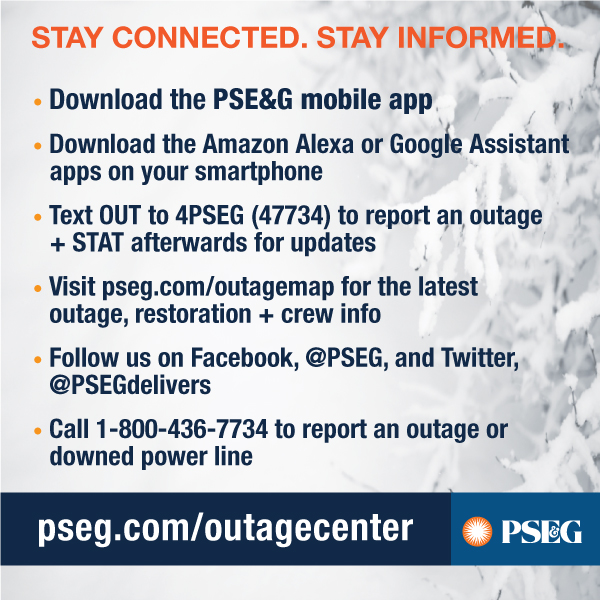PSE&G is Prepared for Windy Rain Storm
PSE&G is committed to working safely to restore any potential power outages and provide excellent service

“As we closely monitor this latest weather event, our crews are prepared and ready to respond safely and as quickly as possible to restore power so customers can celebrate the holidays,” said John Latka, senior vice president, PSE&G Electric Operations, Transmission & Distribution. “PSE&G has additional personnel ready to respond to appliance service requests for ‘no-heat’ calls as well as power outages.”
In advance of the storm, PSE&G crews are performing system and logistics checks to ensure the availability of critical materials, fuel and other supplies to fulfill our commitment to bring customers safe and reliable service regardless of extreme weather conditions.
PSE&G prepares year-round for extreme weather to maintain reliable service for our customers. Ten years after Superstorm Sandy raged across the East Coast, PSE&G continues to work to protect customers’ utility service from the damaging impact of extreme weather by strengthening and upgrading its infrastructure.
Customer safety:
- Downed wires should always be considered “live.” Stay at least 30 feet away from downed lines, and don’t go near the pole or anything touching the line. Immediately contact PSE&G, at 1-800-436-PSEG (7734) via mobile app or our website, to report downed wires and dial 911 if an immediate hazard exists.
- Electric current passes easily through water, so stay away from downed power lines and electrical wires. Don't drive over – and don't stand near – downed power lines.
- Downed lines can potentially be hidden in standing water. If you encounter large pools of standing water, stop, back up and choose another path.
- To prevent carbon monoxide poisoning, do not run any gasoline-powered generators in a garage or any other enclosed space.
- If you are on life-sustaining medical equipment, ensure that you alert PSE&G in advance and notify your local police and fire departments. For more information, visit www.pseg.com/life.
Stay connected:
- Download the PSE&G mobile app to report outages and receive information on restoration times, crew locations and more.
- Register for MyAlerts to receive text notifications at pseg.com/outagecenter.
- Report an outage and receive status updates by texting OUT to 4PSEG (47734). You can also report your outage through our app, website at pseg.com/myaccount or with your voice using the Amazon Alexa or Google Assistanti app on your smartphone.
- Follow PSE&G on PSEG on Facebook and Twitter @PSEGdelivers for updates before, during and after the storm.
- Visit PSE&G’s Outage Map for the latest in outage info, restoration times and crew locations across New Jersey at pseg.com/outagecenter.
- To report an outage by phone, call PSE&G at 1-800-436-PSEG (7734) or use our web chat feature at pseg.com/myaccount.
- Know what to expect if you lose power during a winter storm.
Winter safety tips:
- Have your heating system checked by a professional before operating, particularly if you experienced flooding recently. An overheated boiler or furnace can lead to injury and/or explosion.
- Chimneys and vents for gas appliances must be cleared following a major snow or ice storm to enable proper venting and prevent carbon monoxide accumulation.
- Make sure that snow does not block exhaust from a sidewall vent; otherwise, it could shut down or block heating equipment and dryer exhaust, allowing fumes containing carbon monoxide to build up.
- Accumulation of ice or snow can interfere with the proper operation of your gas metering system. The meter assembly may contain a regulator that is designed to safely release pressurized gas in the event of a malfunction. Blocking the regulator vent could create an unsafe condition where gas is not able to escape from internal piping.
- Snow and ice can damage gas meters and piping. Be careful when removing snow from around the gas meter; any damage to the gas meter could potentially create a possible leak hazard.
- Use a broom to keep the gas meter, pressure regulator, and vent piping clear of snow and ice during the winter season.
- Chimneys and vents should be protected using an approved cap or screen to keep small animals or insects from entering. These pests have been known to build nests inside chimneys or vents and can cause potentially hazardous conditions.
- Inspect and clean dryer vents to ensure they are clear of debris, lint and condensation, which can become a fire hazard especially in the winter when drying heavier clothing and bedding.
- Do not store propane tanks or any other highly flammable gas/liquid in your home, as they can become extremely hazardous in the event of a fire.
Review additional storm preparation tips at https://nj.pseg.com/safetyandreliability/stormsafety.
PSE&G
Public Service Electric & Gas Co. is New Jersey’s oldest and largest gas and electric delivery public utility, serving three-quarters of the state’s population, as well as one of the nation’s largest utilities. PSE&G is the 2022 Edison Award recipient from the Edison Electric Institute. PSE&G has won the ReliabilityOne® Award for superior electric system reliability in the Mid-Atlantic region for 21 consecutive years. PSE&G received the 2022 ENERGY STAR® “Partner of the Year” award in the Energy Efficiency Program Delivery category, and is a 2021 Customer Champion and Most Trusted Brand as named by Escalent. PSE&G is a subsidiary of Public Service Enterprise Group Inc., (PSEG) (NYSE:PEG), a predominantly regulated infrastructure company focused on a clean energy future and has been named to the Dow Jones Sustainability Index for North America for 15 consecutive years (www.pseg.com)
i Amazon, Alexa is a trademark of Amazon.com, Inc. or its affiliates and Google Assistant is a trademark of Google LLC.




















